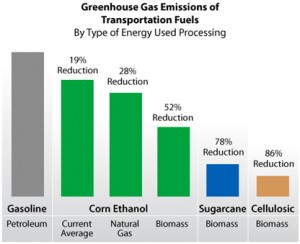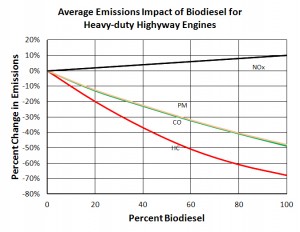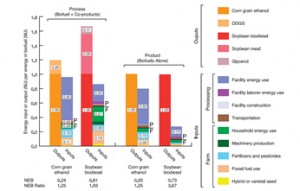Emissions
Using biofuel to operate an automobile is appealing because the CO2 emitted during operation is theoretically captured by the crops that are used to produce the fuel.
Ethanol
The use of blended ethanol and gasoline typically results in the reduction greenhouse gases. From a 2007 study performed by the Department of Energy Bioenergy Technology Office, it is concluded that the presence of ethanol can significantly reduce quantity of greenhouse gases emitted as compared to petroleum.

While corn-based ethanol can result in reduction of up to half the amount of greenhouse gases emitted, sugarcane and cellulose-based ethanol can result in more significant reductions.
Biodiesel
Biofuels tend to burn cleaner than their fossil fuel counterparts. One of the main appealing factors of using biofuels in automobiles is the belief that part of the carbon dioxide released during fuel combustion will be captured by the plants from which the biofuel is extracted. If ethanol or biodiesel is used to replace gasoline or diesel in a car’s engine, there will still be a significant amount of greenhouse gas emission due to engine operation.

This graph illustrates that as cars use a larger percent of biodiesel, the amount of NOx emitted can increase up to 10% (when using a completely pure biofuel). Conversely to NOx, the amount of particulate matter, carbon monoxide, and hydrocarbons emitted all decreased significantly as the percentage of biodiesel present in the engine was increased.
Production
Biofuel plants, which produce ethanol and biodiesel, are cleaner than fossil fuel refineries. Ideally, biofuel production would decrease domestic reliance on foreign oil without significantly reducing the supply of food. The University of Minnesota performed a study to evaluate the energy input to produce the fuel as compared the energy obtained from the fuel once it is produced.

The results of the study concluded that ehtnaol yields 25% more energy than is necessary to produce it, while biodiesel yields 93% more energy than is required to produce it. Still, due to the lack of subsidies present in the biofuel market, they have remained unprofitable in comparison.
Primary Author: Harrison Congdon
Resources:
- http://www.afdc.energy.gov/vehicles/flexible_fuel_emissions.html
- http://www.afdc.energy.gov/vehicles/diesels_emissions.html
- http://www.oeconline.org/resources/livinggreen/onthego/biofuelsresources/biofuels-impact
-
Hill, Jason. "Enviornmental, economic, and energetic costs and benefits of biodiesel and ethanol
biofuels." University of Minnesota: n. pag. Print.
Editor: Kaitlyn Koch